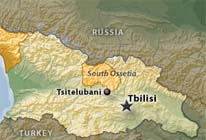Thousands of opposition supporters rally against Saakashvili
 Moscow/Tbilisi - Nearly 10,000 Georgian opposition supporters demonstrated against President Mikheil Saakashvili on Friday, the first major rallies since Georgia's war with Russia in August.
Moscow/Tbilisi - Nearly 10,000 Georgian opposition supporters demonstrated against President Mikheil Saakashvili on Friday, the first major rallies since Georgia's war with Russia in August.
The march marked the first anniversary of a police crackdown on anti-government protestors in 2007. Saakashvili then drew western condemnation when riot police used tear gas, rubber bullets and water guns to breakup the protests and was pushed to call snap elections.
A coalition of opposition parties renewed demands for early presidential and parliamentary elections, promising more rallies towards holding a vote in the spring of 2009.
But at least two major opposition parties, the Republican Party and the Christian Democrats, refused to take part in the marches saying they undermined the country's unity in the face of an enduring threat from Russia.
They warned early elections would "lead the country to deadlock" in a statement to local media Friday.
Three months on from Tbilisi's thwarted attempt to retake its separatist region, a wartime pact to stand unified before Russia has lapsed and politicians, including within the president's party, are growing more vocal in questioning Saakashvili's actions.
The Georgian leader stands accused of misjudging his allies and propelling the small post-Soviet state into a war it could not possibly have hoped to win against regional powerhouse Russia.
"Many are upset and saying why we are not putting an end [to the current regime]? Why did we not end this yesterday or the day before that?," Levan Gachechiladze, a former opposition presidential candidate, told demonstrators. "We should not get tired of the struggle."
Analysts warn that while nothing like the large-scale rallies that erupted last November, opposition could grow as economic growth forecasts dive with the financial crisis and investor confidence remains damaged after the war.
A pro-Western leader and firm ally of the United States, Saakashvili rose to power on the back of popular pro-democracy protest in 2003 known as the Rose Revolution.
Under his leadership the country, strategically set across oil and gas pipelines form the Caspian, moved toward NATO membership and closer ties with the EU.
But the mass demonstrations in 2007 showed disappointment in his ability to deliver on those promises. The United States and other Western backers condemned his declaration of emergency rule during that unrest and have continued to push for the realization of greater political freedoms.
While the international community pledged 3.4 billion euros in aid to Georgia, the country faces an uphill battle after the war with thousands of internally displaced persons having no homes to return to this winter, and Russia now upholding South Ossetia's independence.
A report by the New York Times Friday cast more doubt on Saakashvili's assertion that he sent troops into South Ossetia after heavy shelling of Georgian villages by separatists.
The newspaper reported that independent military observers had told Western diplomats in a briefing they were unable to verify the rebel attacks on Georgian villages.
They also opined in the report that Tbilisi had used disproportionate force and shelled civilian areas in the South Ossetian capital of Tskhinvali. (dpa)